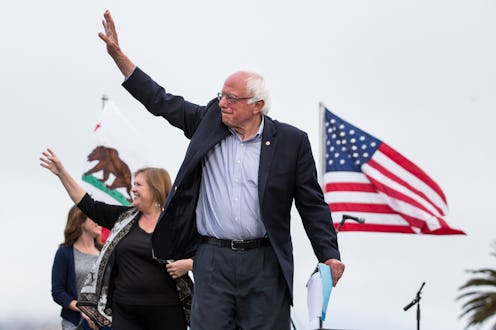News
Sanders Can't Just End His "Revolution"
Tuesday's primaries were nothing if not emotional. From Hillary Clinton's tear-jerking victory speech in which she declared herself the Democratic nominee to Bernie Sanders' impassioned announcement that he's fighting all the way to Philadelphia, tensions mounted as the returns came in announcing that Clinton had won New Jersey. Sanders trudges on despite trailing in pledged delegates, causing some critics to ask the question: why is Sanders staying in the race against Clinton?
He's not just being a hard-headed Northerner: Sanders is forcefully staying in the race because, as he said in his speech in Los Angeles, his campaign has been about "transforming the country." Sanders and his supporters have launched what they believe, for better or for worse, is a full-scale "political revolution," and revolutionaries do not go down without a fight.
From the start, Sanders has made it clear he's not interested in the niceties and politesse employed by career Democrats. To many true-blue Democrats, Sanders lack of concession to Clinton, especially after her self-declared nomination, seems hard-headed at best and deplorably rude at worst. If he were a Democrat, he would have conceded. But Sanders became a Democrat less than a year ago, and he is vying to shift the Democratic party further left to help promote the plight of the working class and heretofore-voiceless. Regardless of whether or not it's foolhardy, his logic is simple: Revolutions only end when revolutionaries give up, and Sanders and his supporters don't plan on giving up anytime soon.
You can't fault the man — Sanders has claimed for more than a month that he will stay in the race until the Democratic National Convention in Philadelphia on July 25, and has repeatedly stated that neither he nor Clinton will have the number of real delegates (as opposed to unpledged "superdelegates," who don't vote until the primary) needed to clinch the nomination by the end of the nation's last Super Tuesday primaries. He's also forecasted a contested convention at the DNC, a claim that's not that far-fetched given that Clinton currently has roughly 1,900 delegates while Sanders has 1,600.
Despite Sanders' assertion that no nominee is apparent (and against the warnings of the Democratic National Committee), the Associated Press called the nomination race in favor of Clinton the night before the June 7 primaries, and Clinton declared herself the nominee before technically securing the required 2,383 delegates due to her reported lead in superdelegates. As far as political maneuvers go, this one was sure to incense Sanders and his testy base, fueling their fire to see their underdog leftist candidate make it to the White House.
Add Berniemania to the AP's supposed gaffe and Clinton's seeming show of hubris in her self-declaration and you have a perfect cocktail for anger that could have a reach far beyond Philadelphia. Sanders' continued bid for the White House might be foolish, but it's not surprising.
